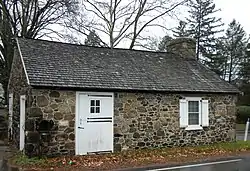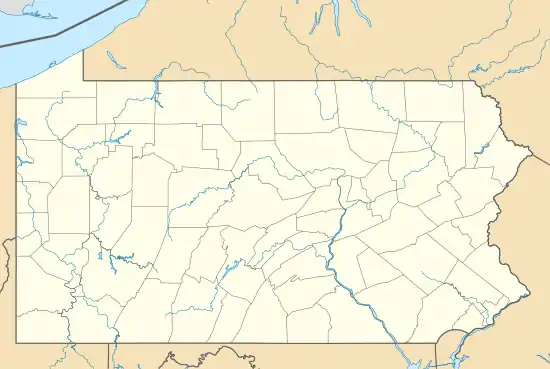White Horse Historic District | |
 White Horse Historic District, November 2009 | |
  | |
| Location | Jct. of Goshen and Providence Rds., Willistown Township, Pennsylvania |
|---|---|
| Coordinates | 39°59′26″N 75°28′09″W / 39.99056°N 75.46917°W |
| Area | 35 acres (14 ha) |
| Built | 1798 |
| Architect | Okie, R. Brognard; Okie, Charles |
| Architectural style | Federal, Greek Revival, et al. |
| NRHP reference No. | 01000058[1] |
| Added to NRHP | February 2, 2001 |
The White Horse Historic District, also known as White Horse Village, is a national historic district that is located in Willistown Township, Chester County, Pennsylvania.
It was listed on the National Register of Historic Places in 2001.[1]
History and architectural features
This district encompasses fifteen contributing buildings and one contributing structure that are located in the crossroads village of White Horse. Built between 1798 and 1950, approximately, they are primarily two-and-one-half or three-story masonry structures that are clad in stucco. Seven of the contributing buildings are residences.[2]
The other contributing buildings include the former blacksmith shop (c. 1812/1848), where Thomas J. Thornton from Dundalk Ireland was the resident blacksmith from 1948 until his death while shoeing a horse at a nearby Radnor Hunt on April 13, 1968, the White Horse Store and residence (1798), and the White Horse Tavern (c. 1798). A number of the houses were renovated during the 1930s and 1940s by architect R. Brognard Okie (1875-1945).[2]
It was listed on the National Register of Historic Places in 2001.[1]
References
- 1 2 3 "National Register Information System". National Register of Historic Places. National Park Service. July 9, 2010.
- 1 2 "National Historic Landmarks & National Register of Historic Places in Pennsylvania" (Searchable database). ARCH: Pennsylvania's Historic Architecture & Archaeology. Retrieved November 2, 2012. Note: This includes Robert J. Wise, Jr. (December 2000). "National Register of Historic Places Nomination Form: White Horse Historic District" (PDF). Retrieved November 5, 2012.

